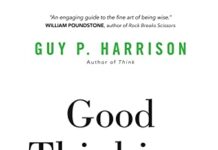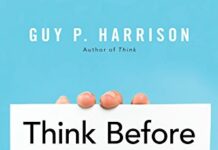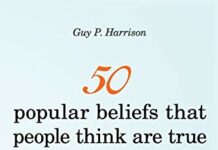
Ebook Info
- Published: 2013
- Number of pages: 242 pages
- Format: PDF
- File Size: 1.82 MB
- Authors: Guy P. Harrison
Description
Think more critically, learn to question everything, and don’t let your ownbrain trip you up.This fresh and exciting approach to science, skepticism, and critical thinking will enlighten and inspire readers of all ages. With a mix of wit and wisdom, it challenges everyone to think like a scientist, embrace the skeptical life, and improve their critical thinking skills.Thinkshows you how to better navigate through the maze of biases and traps that are standard features of every human brain. These innate pitfalls threaten to trick us into seeing, hearing, thinking, remembering, and believing things that are not real or true. Guy Harrison’s straightforward text will help you trim away the nonsense, deflect bad ideas, and keep both feet firmly planted in reality.With an upbeat and friendly tone, Harrison shows how it’s in everyone’s best interest to question everything. He brands skepticism as a constructive and optimistic attitude–a way of life that anyone can embrace. An antidote to nonsense and delusion, this accessible guide to critical thinking is the perfect book for anyone seeking a jolt of inspiration.
User’s Reviews
Reviews from Amazon users which were colected at the time this book was published on the website:
⭐Think: Why You Should Question Everything by Guy P. Harrison”Think” is a fantastic and inspirational book that will teach readers how to think like scientists. Question everything, embrace doubt is a recurring theme that accomplished author, historian, anthropologist Guy P. Harrison drives home with mastery and clarity. This is an entertaining and illuminating book that will empower you to avoid common pitfalls of bad thinking in a constructive way. This enlightening 300-page book includes the following five chapters: 1. Standing Tall on a Fantasy-prone Planet, 2. Pay a Visit to the Strange Thing That Lives Inside Your Head, 3. A Thinker’s Guide to Unusual Claims and Weird Beliefs, 4. The Proper Care and Feeding of a Thinking Machine, and 5. So Little to Lose and a Universe to Gain.Positives:1. Beautifully written and researched book. Harrison has a passion for his topic that is palpable and admirable. A master at conveying clear and inspirational thoughts grounded in good science and sound thinking.2. Skepticism is a great topic. This book is enlightening and fun to read.3. Harrison always delivers! Quality critical thinking goes in before his books come out. He has earned my trust as an author that will consistently deliver a book worthy of my time and interest.4. Drives home the need for skepticism. “Skepticism is an important issue for everyone. It’s something we all need, regardless of intelligence, education, location, social status, or income.”5. This is a thought-provoking book and a quote fest, “Skepticism is just about having a healthy dose of doubt and using reason to figure out what is probably real from what is probably not real. It means not believing you know something before you can prove it or at least make a very good case for it. Skepticism is nothing more than thinking and withholding belief until enough evidence has been presented.”6. Harrison has a unique gift of giving intellectual beat downs in the nicest and most constructive ways. “Millions of people say that paranormal mind powers can move objects. Big deal; people can say anything. Let’s wait until someone gets around to proving it before we get excited. In the meantime, why not check out how nature moves entire continents? It’s called plate tectonics and scientists have plenty of evidence for it.”7. In defense of good science. “Science is best thought of as a tool. And, like most tools, it can be used to do something constructive or to whack somebody over the head. Science is a great way of thinking and discovering that helps us figure out much about the world and the universe.”8. Debunking common misconceptions. “Being smart, whatever that word means to you, doesn’t automatically make someone a good skeptic.”9. Understanding the right approach to skepticism and it may involve just asking the right questions. “If believers refuse to think critically about their claims, then call them on it. Why are you reluctant to challenge a claim that you say is so important and obviously true? What are you afraid of?”10. The value of being a good skeptic. “Weak skepticism is perhaps the greatest unrecognized global crisis of all. Every day, people waste time, throw away money, suffer, and even die because they failed to think like a scientist.”11. A great discussion on brain science and how it relates to skepticism. “The good news for you is that just being aware of how your brain goes about its business greatly improves your chances of keeping both feet planted in reality.” A bonus quote, “We don’t really see what we look at. Instead our brain tells us what we see, and it doesn’t give us the complete and accurate picture.” Great stuff!12. One of the great strengths of this wonderful book: reasons to be skeptical. Harrison goes through a long list of reasons to be skeptical in an accessible and intelligible manner.13. Sound scientific principles. “The best we can do is accept conclusions that are backed up by the best evidence we have today and agree to change our minds if better evidence ever comes along that says something different tomorrow.”14. Great examples of common biases/fallacies and how to recognize them. Base-rate fallacy. “We can readily find ourselves focusing on one tiny speck of information (a single story, for example) or on bad data that supports a claim while simultaneously ignoring more credible information or a larger body of data that goes against it.”15. Provides MANY great examples of bad claims. “The basic claim of homeopathic medicine is that water can “remember” an active ingredient in the original brew and that–contrary to logic–the more you dilute the solution, the more potent it becomes for treating diseases. Most homeopathic remedies are diluted to such extremes that there is nothing left of the original active ingredient!” “Complementary or alternative medicine is really just unproven medicine.”16. Find out Harrison’s favorite end-time scenario.17. Addressing the so called Moon-hoax, “The late Neil Armstrong, the first man to walk on the Moon, summed it up nicely: “It would have been harder to fake it than to do it.”18. Good overall health, including brain health. “There is just something about flipping back and forth between languages that keeps a brain sharp and healthy. It even seems to delay for years the onset of Alzheimer’s disease in elderly people.”19. The hard cold facts, “humankind currently spends hundreds of billions of dollars per year on fortunetellers, medical quackery, and other nonsense.”20. A sense of awe. “By the way, if your life ever seems too slow, just remember that the Earth is spinning at the equator at a rate of about a thousand miles per hour. We are also flying through space around the Sun at speeds of more than 65,000 miles per hour.”21. Excellent notes, Bibliography and even a section called Resources to Keep Learning.Negatives:1. There is very little in this excellent book to complain about other than the feeling I get that Harrison wanted to go deeper into some of the topics and decided to go for quality and brevity over a more comprehensive approach.2. On such an ambitious and broad topic like thinking and skepticism you can certainly question everything but it’s too hard to cover everything. That is, some topics were left out: 911 conspiracy, Holocaust deniers, etc… understandably so.In summary, what a wonderful and inspirational book this turned out to be. Skepticism is a fantastic topic that has real value for the individual and society. Harrison succeeds in showing how to put good thinking into practice by applying it to a number of fascinating and popular paranormal claims. But what set this book apart from most is the youthful glee for knowledge and the quest for wisdom. “I love knowing that I’ll never run out of things to learn and experience.” My sentiments exactly! You owe it to yourself to be a good skeptic, get this book and learn how.Further recommendations: ”
⭐” and ”
⭐” by the same author, “Critical Thinking” by Wayne Bartz, ”
⭐” and “The Magic of Reality” by Richard Dawkins, ”
⭐” by Carl Sagan, ”
⭐” edited by John Brockman, ”
⭐” by Robert J. Gula, ”
⭐” by Joe Nickell, ”
⭐” by Paul A. Offit, “Tales of the Rational” by Massimo Pigliucci, “Voodoo Science” by Robert Park, ”
⭐” by Robert M. Hazen “Fool Me Twice: Fighting the Assault on Science” by Shawn Lawrence, “Lies, Damned Lies, and Science” by Sherry Seethaler, and “Science Under Siege” by Kendrick Frazier.
⭐If you read ‘Think: Why You Should Question Everything’, and practice strong skepticism, you will see your wallet grow fatter, your body and brain get healthier, and our world will be better place for everyone.Inspired by reading ‘Think’, here are 21 reasons why thinking and being a good skeptic will benefit you, your family, and your world:1) Economic benefits of skepticism a. Reduces money you squander on crackpots, quacks, and shysters. b. Decreases spend on dubious businesses: psychics, spiritual healers, alternative medicines, and miracle cures. c. Increases dollars and tax revenues to fund scientific research and development of proven products backed by solid evidence, science, and medical effectiveness.2) Intellectual benefits of skepticism a. Avoids groups and organizations that discourage asking meaningful questions. b. Starves out (from lack of support) groups that prey on the weak and suffering. c. Stimulates creative-thinking, by encouraging questions rather than settling for simple, absolute answers.3) Spiritual benefits of skepticism a. Eliminates delusions and wishful-thinking, evaluates extraordinary claims using reason. b. Avoids investing your time and energy on con-artists, false prophets, and faith healers. c. Shrinks organizations that are based on dubious and supernatural claims.4) Ethical/Moral benefits of skepticism a. Questions exploitation of anyone, including women, children, and all minorities. (Examples: faith traditions that are unethical and immoral, includes beliefs that: women are subservient to men, gays are an abomination, masturbation is a sin). b. Reduces hate crimes and murders (motivated by irrational beliefs and religious fanaticism). c. Helps us treat others more fairly and justly (by reducing bigotry and self-righteousness).5) Psychological/Emotional benefits of skepticism a. Minimizes gullibility and shame in succumbing to quackery and religious guilt. b. Clears thinking. Conducts our lives based on reality, not delusive wishful-thinking. c. Generates personal responsibility for changing ourselves and our world (rather than waiting for or giving credit to a divine, mystical being to fix things).6) Physical benefits of skepticism a. Assesses health claims based on medical science, not pseudoscience (fake science), quack or homeopathic potions, energy healing, or crackpot medical treatments. b. Saves lives based on using proven medicine (versus avoiding blood transfusions for religious reasons, overdosing on supplements or not getting proper medical care, or parents who don’t take their children to doctors because of their faith). c. Eliminates diseases and plaques (eg. recent resurgence of epidemics of measles in U.S. and HIV/AIDs in Africa due to bad thinking- “vaccines are harmful”, “condoms are immoral”).7) Social/Cultural benefits of skepticism a. Questions herd mentality, mass marketing, group think, and peer pressure. It’s OK to say “no”, to not buy it. b. Reduces bad choices, embarrassment, and shame. (eg. You don’t spend many years or thousands of dollars on bad products or programs, such as: ineffective abstinence only sex ed for teens, starting wars based on bad evidence, or blind following of leaders with corporate, political, or religious authority). c. Improves individuals, families, and helps society progress. All of the above 20 benefits collectively make us better: as individuals, communities, and as a sane, healthier world.
⭐Finished the book in one sitting and was waiting to get real advice on why you should question everything. The answer didn’t come but the key takeaway was…you should not trust your brain because it’s very good at making things up that aren’t real!
⭐Harrison’s book, while containing no original discoveries made by the author, provides a rock-solid original syntheses of basic knowledge in the field of knowledge about human bias.One thing that concerns me about all such popular science books is that much of the knowledge authors convey in them is not supported with citations to the source of that knowledge. This can lead to problems when seemingly skeptical authors inadvertently disseminate unevidenced supermyths. Fortunately, Harrison appears to have avoided that most ironic problem. And he does, to be fair, provide many – but in my pedantic and idiosyncratic opinion – not enough citations to the original publications that form the knowledge base of this excellent little book. This is typical of successful popular science books, because publishers `know best’ that it is a necessary evil to make them popular. Personally, I’m skeptical I THINK that it might, possibly, be a self-fulfilling prophecy. Obviously more research is required.I particularly liked the author’s heuristic device of using a fictional story line of the life of a bright child ruined by a downward spiral of bias when she sees a flock of birds and mistakes it for a UFO. This is positively Dickensian skepticism if there ever was. It sticks in the mind. Harrison’s story telling glues the pages of this book together and that makes it a valuable edition to my skeptical library.The author’s ability to convey complex ideas such as natural selection with modern culture is brilliant. I’m not going to spoil your enjoyment of this book by revealing more. But will end this positive review with some words by Harrison that I intend to share with others on my my social media communications platform of websites, blogs and twitter accounts. And by such certain further dissemination by others, such as I, with smaller brains than our forebears, will this book most certainly become a best seller in a world full of people, who are, counter intuitively, more stupid as individuals than prehistoric cave-folk – but perhaps becoming more intelligent collectively like ants and bees:`Interestingly, prehistoric people had slightly bigger brains than we do today and they might have been more intelligent. This makes sense when you consider how unforgiving life would have been for Stone Age dimwits. Most would have been selected out of the gene pool early by poisonous berries, falling rocks, and hungry predators. Today however, the dimmest not only survive at high rates, but some of them belong to an extremely successful subspecies known as “celebrities” and star in reality TV shows.’
⭐I was introduced to evidence based thinking a couple years back and didn’t really grasp it properly. Now I understand it a lot better and this book has really helped in that greater understanding. Brilliant take skepticism. Thoroughly enjoyed it. The advice in this book will no doubt save me a lot of time and money!
⭐Good
⭐Kind of OK if you’ve never ever thought about anything or ever challenged your own daft beliefs about astrology or ghosts before I suppose. Lots of repetition and direct addresses to the reader, presumably to reassure us poor bumbling idiots who can’t be bothered to think for ourselves. But for anyone with half a brain or a half-decent education there is very little new or surprising or, frankly, interesting here. I thought scepticism (certainly in the Pyrrhonian tradition) was all about suspension of belief and emphasising the uncertainty of our supposed knowledge. Apparently, according to this book, it’s actually about not believing quack doctors and astrologers and pouring scorn on religion. My recommendation — get Carl Sagan’s
⭐The Demon-haunted World: Science As a Candle in the Dark
⭐or pretty much anything else by Sagan, a much better writer and a far deeper thinker on these issues.
⭐The writing is light and entertaining. Some of the phrases and examples made me lough out loud. The author disposes of most of the hysterical claims born of unreasonable fear, unfounded belief, or pure brainwashing and dogma which permeate our civilisation. Being a born skeptic, I did not need a lot of convincing. Some examples of damage which excessive credulity can cause were perhaps too obvious and predictable for me. Of course, I have been stunned in the past by how little skepticism some people exhibit. In spite of the evident and massive opinion manipulation in today’s media which cannot go unnoticed by any reasonably educated person. Or how selective this skepticism is, if it does exist. Alas, I doubt these people will reach for this book. I think it is an excellent book for a younger reader. It intelligently smuggles some scientific gems (for example about how our brain works, how it evolved, and why its functionality may sometimes mislead us) which inspire interest in some true knowledge available today. I intend to pass it on to my two teenage sons.
Keywords
Free Download Think: Why You Should Question Everything in PDF format
Think: Why You Should Question Everything PDF Free Download
Download Think: Why You Should Question Everything 2013 PDF Free
Think: Why You Should Question Everything 2013 PDF Free Download
Download Think: Why You Should Question Everything PDF
Free Download Ebook Think: Why You Should Question Everything



